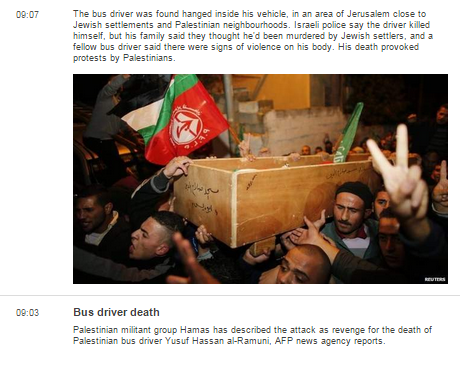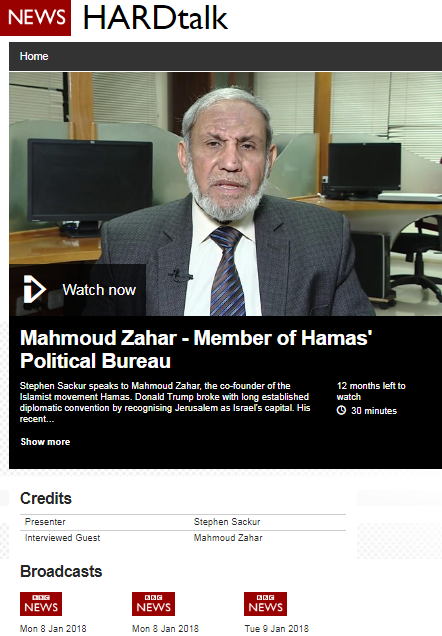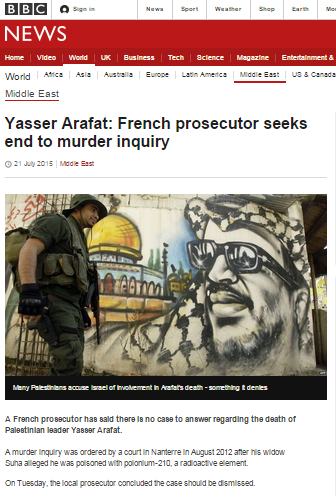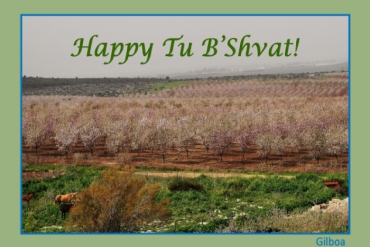In addition to its main article on the subject of the November 18th terror attack at the Kehilat Ya’akov Synagogue in the Har Nof neighbourhood of Jerusalem and its inaccurately illustrated profile of the PFLP (both of which were discussed here), the BBC News website also published a number of additional articles on that day.
Profiles of the dual British and American citizens murdered in the terror attack appeared on the website’s UK and US & Canada pages respectively. The BBC News website also ran a live page throughout the day on November 18th under the title “As it happened: Jerusalem synagogue attack“. On the banner at the head of the page BBC audiences were provided with a number of “Key Points” concerning the story, none of which included the word terror but which did ‘contextualise’ the attack by attributing it to “rising tensions” over what is inaccurately described as a “disputed holy site” (Temple Mount) and “Israeli plans for settler homes”.
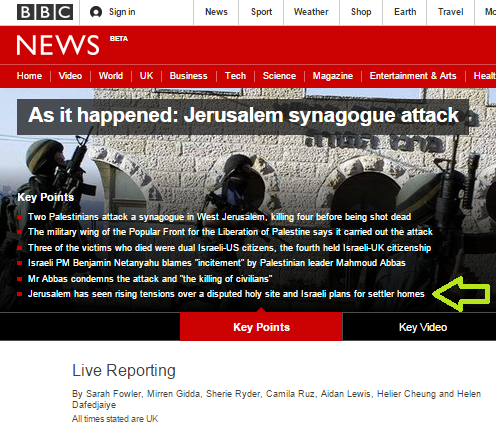 Among the numerous notable features of that live page was the fact that just over an hour after it was opened, it was used to amplify inaccurate hearsay concerning a bus driver who committed suicide earlier in the week, with no effort made to inform BBC audiences of the fact that pathologists – including one chosen by the dead man’s family – had already ruled out foul play until the appearance almost an hour later of a partially informative tweet by a BBC employee.
Among the numerous notable features of that live page was the fact that just over an hour after it was opened, it was used to amplify inaccurate hearsay concerning a bus driver who committed suicide earlier in the week, with no effort made to inform BBC audiences of the fact that pathologists – including one chosen by the dead man’s family – had already ruled out foul play until the appearance almost an hour later of a partially informative tweet by a BBC employee.
The page also included the item below, with no attempt made by the BBC to adhere to its own editorial guidelines on impartiality by informing readers that Daniel Seiderman is in fact a political activist with the foreign-funded organisations Ir Amim and Terrestrial Jerusalem.
Like the day’s main article, this live page promoted an inaccurate BBC article from April 2014.
“For more on what makes Jerusalem so holy – to Christianity, Islam and Judaism – take a look at this explainer by the BBC’s Erica Chernofsky.”
The BBC supplied readers with a variety of ‘explanations’ for the background to the terror attack.
“A key source of tension in Jerusalem has been the renewal of an ancient dispute over the rights of prayer at a key holy site, known to Muslims as al-Haram al-Sharif and to Jews as the Temple Mount. By long-standing convention, Muslims alone have the right to pray there, but some religious Jews have been campaigning to end that monopoly of worship.”
“Yolande Knell, BBC News, Jerusalem
Political vacuum
The Palestinian position has been that the issue of the al-Aqsa mosque and announcements about settlements have all added fuel to the fire here.
The breakdown of peace talks between Israelis and Palestinians in April created a political vacuum, and now it seems it has been filled by violence.”
“There have been several deadly attacks and clashes in Jerusalem recently amid tension over a disputed holy site.”
“Quentin Sommerville, BBC Middle East correspondent
As horrifying as this incident was, I do not think many people in this city were incredibly surprised by it. More than anything there is a sense of hopelessness here after the failure of peace talks, with no road map or talks. We are hearing a lot of fighting talk, but not a lot of peace talk by either the Israeli or Palestinian leaders to try to de-escalate the tensions.”
“Some background on East Jerusalem: Israel has occupied East Jerusalem since capturing it from Jordan in the 1967 Middle East war. It annexed the area in 1980 in a move that was not recognised internationally. Palestinian residents have long complained of discrimination, and blame increasing tension on the growing number of Jewish settlers moving to the area.
The BBC’s Yolande Knell has written a report about the rising tensions.”
Knell’s article was previously discussed here.
“What caused the attack?
What led to the deadly attack in Har Nof? It follows months of unrest and apparent revenge killings, as our video explains.”
That video will be discussed separately in a later post.
In addition to the BBC’s own above ‘explanations’ of the surge in violence and terrorism in Jerusalem, it also saw fit to provide context-free amplification on this live page for assorted inaccurate statements and downright lies from a variety of Palestinian officials.
“Hamas spokesman Ghazi Hammad tells the BBC most people in Jerusalem “expected this would happen today or tomorrow, because every day Jerusalem is boiling. Every day, there is a crime against Palestinian citizens in either al-Aqsa mosque or in Jerusalem as a city”.
Mr Hammad would not say whether Hamas supported the attack, but said Israel was to blame for the tensions. “We did not see any effort, any action from the Israeli government in order to stop the settlers, in order to stop the radical religious men when they decided to attack the al-Aqsa mosque.” “
And:
“‘Israel responsible’
Mustafa Barghouti from the Palestinian Legislative Council tells the BBC that Israel is “responsible for the bloodshed”.
“In this case, it is the Israeli government that provoked the Palestinians in this terrible manner,” he said, adding that more than 2,000 Palestinians had been killed by the Israeli army and Israeli settlers this year.
Most of the deaths occurred during the Israel-Gaza conflict over July and August.”
And:
“Sabri Saidam, political adviser to the Palestinian president Mahmoud Abbas, tells the BBC: “Tensions have been mounting because Israel has been pushing for more annexation of land, confiscating more homes and has been working vividly to build more and more settlements.
“As you know this formula is totally unsustainable and infuriates the Palestinians and creates the scenes that we saw today.” “
As has been the case in all previous BBC News reporting on the issue of the rise in violence and terrorism in Jerusalem, the topic of Palestinian incitement (including that from partners in the current ‘unity government’) was not independently reported – or even acknowledged – by the BBC and was mentioned only in the form of second-hand statements from Israeli spokespeople.
That editorial policy might perhaps be explained by Jeremy Bowen’s contribution to this live page, in which he defined inflammatory calls by the PA President to ‘defend’ the Al Aqsa Mosque from a ‘threat’ which does not exist as sounding “reasonable” to Palestinians – of whom he apparently has very low expectations indeed.
“Jeremy Bowen, BBC Middle East editor
Many Palestinians believe Israel is preparing to allow Jews to pray in the compound of the al-Aqsa mosque in Jerusalem, the third holiest site for Muslims after Mecca and Medina. The Israeli government has denied that emphatically. But Palestinians listen to calls from hard right-wing Jewish nationalists and believe it might happen.
Palestinian President Mahmoud Abbas has called for Palestinians to defend al-Aqsa. For Palestinians that sounds reasonable. The Israeli government has condemned it as incitement to terrorism. Both Palestinians and Israelis are now talking about a third Palestinian uprising – or intifada. It’s too early to say one has started. But in the absence of political action to stop the violence escalating, another intifada is a distinct possibility.”
A version of that statement was also featured in Bowen’s separate article published on November 18th under the title “Jerusalem attack reflects rising Israeli-Palestinian tension“. There, displaying a remarkable ability to deny elements of both pre and post 1948 Palestinian violence, Bowen also told readers that: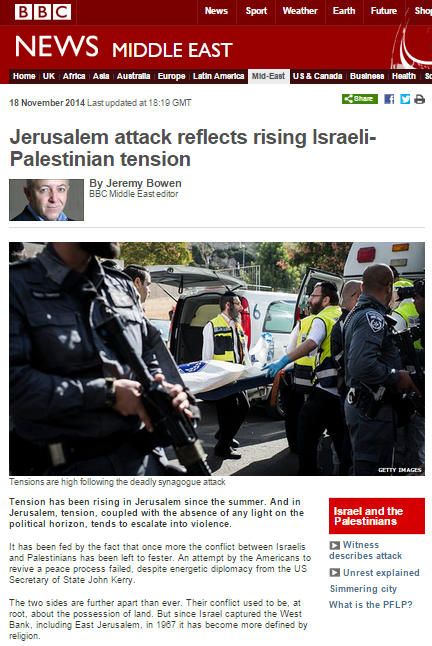
“The two sides are further apart than ever. Their conflict used to be, at root, about the possession of land. But since Israel captured the West Bank, including East Jerusalem, in 1967 it has become more defined by religion.
Perhaps that was why the Palestinians chose a synagogue for the attack that killed the four Jewish worshippers. There have been other attacks on Israelis in recent months by Palestinians, one of which killed a baby.”
Bowen whitewashed the PA’s scuppering of the last round of negotiations (as indeed he did at the time) by erasing from audience view that body’s decision to form a unity government with the terrorist organization Hamas.
“An attempt by the Americans to revive a peace process failed, despite energetic diplomacy from the US Secretary of State John Kerry.”
Predictably, Bowen also promoted the decidedly stereotypical and condescending notion that Palestinians are unable to refrain from attacking Jews with meat-cleavers, knives guns or vans because of Israeli planning decisions and –as has been the case in previous BBC reports – portrayed property legally purchased by Jews in specific neighbourhoods of Jerusalem as being inhabited by “settlers”.
“Palestinians are also angry about the continued growth of Jewish settlements in East Jerusalem. The big settlements in occupied land in East Jerusalem were built on largely open ground. But now the emphasis is on settling Jewish families in areas that are otherwise populated by Palestinians.
The proximity of the two sides, and the feeling that Palestinians have that their land is being taken by armed settlers, leads to trouble.
A particular flashpoint is Silwan, near the walled old city, which settlers have renamed City of David.”
The existence of Kfar Shiloach and the expulsion of Jews from that area during the Arab Revolt of course does not fit into Bowen’s ‘Arab East Jerusalem’ narrative any more than does Jerusalem’s ancient history.
A link to Bowen’s article and quotes from it were also featured in the BBC News website article titled “Synagogue attack: Netanyahu vow in ‘battle for Jerusalem’” which replaced the main article on the Middle East page later in the evening on November 18th.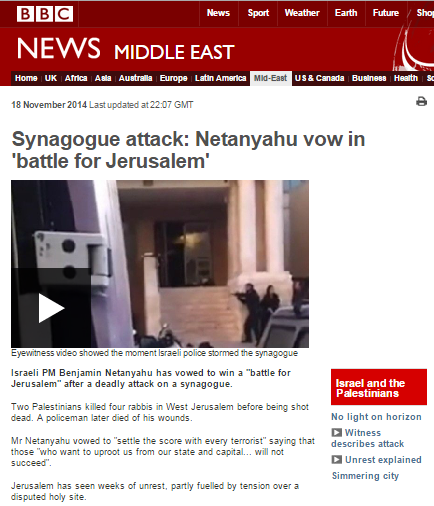
Like its predecessor, that article also failed to properly describe the oddly termed “deadly attack on a synagogue” as terrorism. Once again, the report ‘contextualised’ the terror attack by providing readers with the same ‘explanations’ for the violence.
“Jerusalem has seen weeks of unrest, partly fuelled by tension over a disputed holy site.”
“Tensions in the city have risen in recent weeks, with two deadly attacks by Palestinian militants on pedestrians in the city and announcements by Israel of plans to build more settler homes in East Jerusalem.
The Jerusalem compound that has been the focus of much of the unrest – known to Jews as the Temple Mount and to Muslims as al-Haram al-Sharif – is the holiest site in Judaism, while the al-Aqsa Mosque within the compound is the third holiest site in Islam.
Orthodox Jewish campaigners in Israel are challenging the longstanding ban on Jews praying at the compound.”
And again, no mention was made by the BBC of the incitement and glorification of terrorism from Palestinians of various factions, including partners in the ‘unity government’.
The article again failed to inform readers of the fact that a team of pathologists – including one chosen by the dead man’s family – had determined that Yousef Hassan Al-Ramouni’s death earlier in the week was self-inflicted.
“He [Netanyahu] accused Mr Abbas and militant group Hamas of spreading “blood libel” that a bus driver who reportedly took his own life in East Jerusalem on Monday had been “murdered by Jews”.
Hamas had said the Jerusalem attack was in revenge for the death of the driver, who was found hanged inside a vehicle. His family did not accept the post-mortem findings of suicide.”
As we see, this latest batch of BBC News website reports on the subject of a terror attack in Jerusalem joins all the others produced during the last four weeks in promoting a plethora of ‘reasons’ for the surge in violence and terror attacks in that time, all of which imply that the deterioration of the security situation can ultimately be attributed to Israeli actions. The only references to Palestinian incitement and glorification of terrorism have been in second-hand quotes from Israelis and the BBC’s news reports continue to avoid independently informing audiences of that crucial factor, thus actively denying them the ability to enhance their awareness and understanding of this particular “international issue“.

